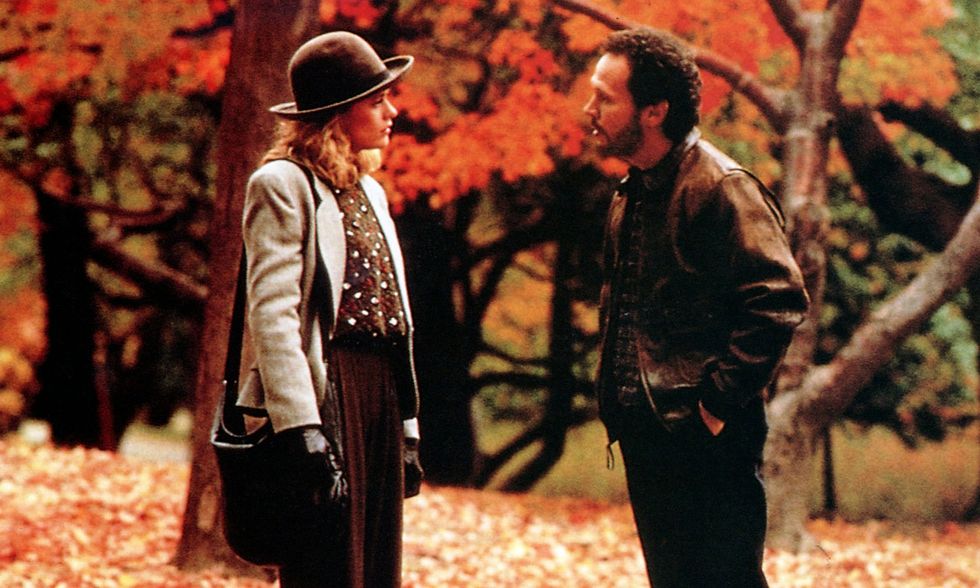“Sleepless in Seattle.” “When Harry Met Sally.” “My Best Friend’s Wedding.”
All classics. If you’re in the mood to watch a romantic comedy, you’re more than likely to choose something from the 1980s or '90s — it’s the golden rule, a way of life. Actually, 1998 specifically saw a 50% increase in romantic comedy scripts brought to the studios from the previous year.
That’s kind of weird, right? People watch and pay for movies to escape the realities of their lives. But even a love story can seem out-of-this-world when you’re faced with a less-than-impressive romantic life. So, this begs the question: Why do we still turn to the classics? Where are our present-day rom-coms?
Well, today’s rom-coms certainly hold near similar premises to our beloved 1990s films, namely in the conventional “meet, separate, unite” formula, but Hollywood isn’t necessarily in the market for them anymore. Times are changing, and we can’t desire and expect the same white, heterosexual, male-dominated relationships that movies like Rob Reiner’s “When Harry Met Sally” have delivered in the past.
Some context for you, if you just so happen to be the .0002% of people who have never seen it: In “When Harry Met Sally,” Harry and Sally meet when they’re set up for a road trip from Chicago to New York by a mutual friend. They don’t get along, don’t expect to ever meet again, but keep running into each other every few years until a close friendship forms and they eventually fall in love — after some rocky obstacles, of course, such as when they first sleep together and Sally subsequently assumes they’re in a relationship, and that’s not what Harry wants. *Cue eye roll.*
However, the film before this point is reliant on the rocky relationships the two have before they end up together — more specifically, Sally’s struggle to get married. Sally has had on-and-off relationships with men for years, all of which eventually fizzle out (obviously). The older and more single she gets, the more stressed out she becomes about finding a husband.
At one point, she’s at lunch with her friends and has just announced that she and her long-term boyfriend have broken up, only after her married friend points out the their other single friend (who is yearning over her married boyfriend who she has just realized will never leave his wife) that Sally is in a happy relationship and she could be, too. The single friend make a comment about a ticking clock, and Sally nonchalantly replies, “The clock doesn’t really start to tick until you’re 36.” She is 31.
Sound familiar?
Here’s the problem: Marriage is no longer primarily a business arrangement, and that’s because women are no longer expected to be the dependent, submissive stay-at-home moms that society has once pressured them to be.
Before you say it: No, that’s not a bad thing, but if it was still common, why are so many women defending their choice to become one? It’s just not something our society would deem a popular life path today. And here’s why:
Legalized, heterosexual monogamy suggests that a woman’s function – in society, in life, in every '90s rom-com – is to civilize a man, guarantee his continuance of masculinity through children. In a male-dominated society (which does indeed exist, no matter how much we wish it didn’t!), there’s an “ownership” over women.
Correct me if I’m wrong, but that creates a whole lot of problems for the 21st century’s feminist audience.
Now, before you come at me with some “Crazy, Stupid, Love” bullshit, listen up, because I’m only going to say this once: IT’S NOT THE SAME. I don’t know if it’s the nostalgia factor (can I be nostalgic about a movie that came out before I was born?), the fact that everyone is obsessed with '90s culture again, or some other paranormal factor no one would be able to explain, but the oldies are kind of the only goodies left.
So, does still liking/actively watching '90s rom-coms make me a bad feminist?
I’m independent and career-driven. I don’t want children of my own (but respect stay-at-home moms). I ironically have a wedding Pinterest board despite not really caring if I get married someday. I’m positive I don’t like rom-coms because I deep down wish I was the female protagonist.
So… What’s the deal?
In the end, all of these things can be true. You can be a feminist and still wish a man loved you the way Tom Hanks loves Meg Ryan in, like, every rom-com ever made. It’s not weird to daydream about a life you’ll never have, because frankly, falling in love is not as easy (or crazy?) as owning rival bookstores across the street from each other – for most people, at least.
Rom-coms offer their viewers a lot more than the prospect of love, anyway. I, personally, am more interested in those affordable New York studio apartments with perfectly exposed brick that every rom-com character in history lives in.
As long as you are aware that you don’t have to fall in love with your best friend of 10+ years, have the perfect wedding and exactly 3.5 kids to be happy, then where’s the harm in ogling Hugh Grant for an hour and a half?
















